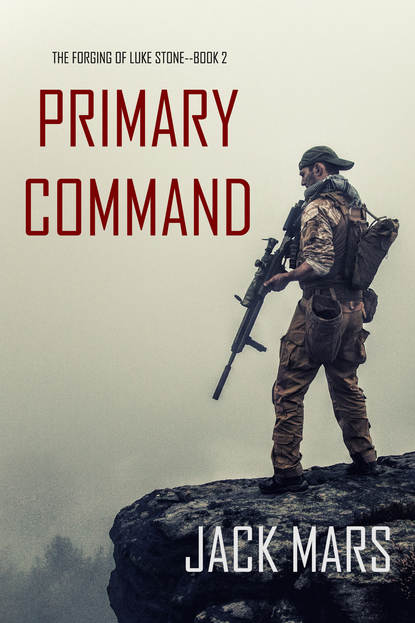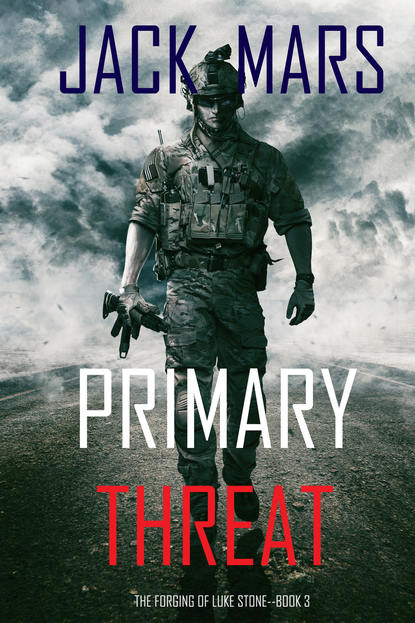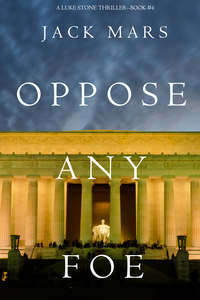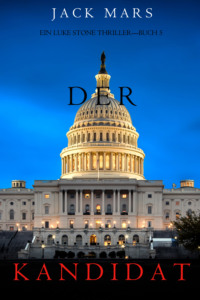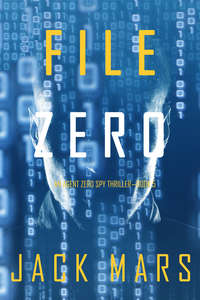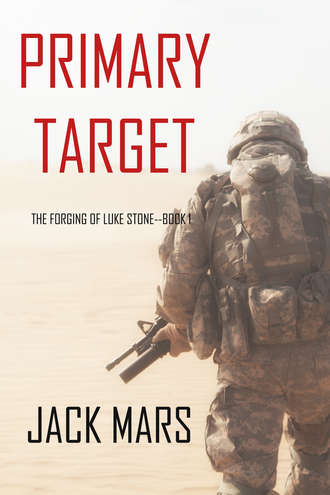
Полная версия
Primary Target
Luke said nothing. He just stared at Riggs. The man was out of his mind. He was the crazy one. He wasn’t even slowing down.
“Stone, I see you Delta guys come through here from time to time. You never have a scratch on you. You guys are like, supernatural. The bullets always miss you somehow. But you’re freaked out. You’re burnt out. You’ve seen too much. You’ve killed too many people. You’ve got their blood all over you. It’s invisible, but it’s there.”
Riggs nodded to himself.
“We had a Delta guy come through here back in oh-three, about your age, insisted he was fine. He had just come back from a top secret mission in Afghanistan. It was a slaughterhouse. Of course it was. But he didn’t need all this talk. Sound like anybody we know? When he left here, he went home, killed his wife, his three-year-old daughter, and then put a bullet in his own brain.”
A pause drew out between Luke and Riggs. None of the other men said a word. The guy was a button pusher. For some reason, he saw that as his job. It was important that Luke stay cool and not let Riggs get under his skin. But Luke didn’t like this kind of thing. He felt a surge building inside him. Riggs was moving into dangerous territory.
“Is that what you’re scared of?” Riggs said. “You’re worried you’re gonna go home and blow your wife’s brains all over the—”
Luke was up from his chair and across the space between him and Riggs in less than a second. Before he knew what had happened, he had grabbed Riggs, kicked his chair out from under him, and thrown him to the floor like a rag doll. Riggs’s head banged off the stone tile.
Luke crouched over him and reared back his fist.
Riggs’s eyes were wide, and for a split second fear flashed across his face. Then his calm demeanor returned.
“That’s what I like to see,” he said. “A little enthusiasm.”
Luke took a deep breath and let his fist relax. He looked around at the other men. None of them had made a move. They just stared dispassionately as if a patient attacking his therapist was a normal part of their day.
No. That wasn’t it. They stared like they didn’t care what happened, like they were beyond caring.
“I know what you’re trying to do,” Luke said.
“I’m trying to break you out of your shell, Stone. And it looks like it’s finally starting to work.”
* * *“I don’t want you here,” Martinez said.
Luke sat in a wooden chair next to Martinez’s bed. The chair was surprisingly uncomfortable, as if it had been designed to discourage loitering.
Luke was doing the thing he had avoided for weeks—he was visiting Martinez. The man was in a different building of the hospital, yes. But it was all of a twelve-minute walk from Luke’s own room. Luke hadn’t been able to face that walk until now.
Martinez was on a long road, a road that he seemed to have no interest in traveling. His legs had been shredded, and could not be saved. One was gone at his pelvis, one below the knee. He still had the use of his arms, but he was paralyzed from just below his ribcage down.
Before Luke came in here, a nurse whispered to him that Martinez spent most of his time crying. He also spent a lot of time sleeping—he was on a heavy dose of sedatives.
“I just came to say goodbye,” Luke said.
Martinez had been staring out the window at the bright day. Now he turned to look at Luke. His face was fine. He had always been a handsome guy, and he still was. God, or the Devil, or whoever was in charge of these things, had spared the man his face.
“Hello and goodbye, right? Good for you, Stone. You’re all in one piece, you gonna walk right out of here, probably get a promotion, some kind of citation. Never see another minute of combat because you were in the psych ward. Ride a desk, make more money, send other guys in. Good for you, man.”
Luke sat quietly. He folded one leg over the other. He didn’t say a word.
“Murphy stopped by here a couple of weeks ago, did you know that? I asked if he was going to see you, but he said no. He didn’t want to see you. Stone? Stone’s a suck-up to the brass. Why should he see Stone? Murphy said he’s gonna ride the freight trains across the country, like a hobo. That’s his plan. You know what I think? I think he’s gonna shoot himself in the head.”
“I’m sorry about what happened,” Luke said.
But Martinez wasn’t listening.
“How’s your wife, man? Pregnancy coming along good? Little Luke junior on the way? That’s real nice, Stone. I’m happy for you.”
“Robby, did I do something to you?” Luke said.
Tears began to stream down Martinez’s face. He pounded the bed with his fists. “Look at me, man! I have no legs! I’m gonna be pissing and shitting in a bag the rest of my life, okay? I can’t walk. I’m never gonna walk. I can’t…”
He shook his head. “I can’t…”
Now Martinez began to weep.
“I didn’t do it,” Luke said. His voice sounded small and weak, like a child’s voice.
“Yes! You did it! You did this. It was you. It was your mission. We were your guys. Now we’re dead. All but you.”
Luke shook his head. “No. It was Heath’s mission. I was just—”
“You bastard! You were just following orders. But you could have said no.”
Luke said nothing. Martinez breathed deeply.
“I told you to kill me.” He gritted his teeth. “I told you… to… kill… me. Now look at this… this mess. You were the one.” He shook his head. “You could have done it. Nobody would know.”
Luke stared at him. “I couldn’t kill you. You’re my friend.”
“Don’t say that!” Martinez said. “I’m not your friend.”
He turned his head to face the wall. “Get out of my room.”
“Robby…”
“How many men you killed, Stone? How many, huh? A hundred? Two hundred?”
Luke spoke barely above a whisper. He answered honestly. “I don’t know. I stopped counting.”
“You couldn’t kill one man as a favor? A favor to your so-called friend?”
Luke didn’t speak. Such a thing had never occurred to him before. Kill his own man? But he realized now that it was possible.
For a split second, he was back on that hillside on that cold morning. He saw Martinez sprawled on his back, crying. Luke walked over to him. There was no ammo left. All Luke had was the twisted bayonet in his hand. He crouched down next to Martinez, the bayonet protruding from his fist like a spike. He reached up with it, above Martinez’s heart, and…
“I don’t want you here,” Martinez said now. “I want you out of my room. Get out, okay, Stone? Get out right now.”
Suddenly, Martinez started screaming. He took the nurse call button from his bedside and began ramming it with his thumb.
“I want you out! Get out! Out!”
Luke stood. He raised his hands. “Okay, Robby. Okay.”
“OUT!”
Luke headed for the door.
“I hope you die, Stone. I hope your baby dies.”
Then Luke was out in the hall. Two nurses were coming toward him, walking but moving fast.
“Is he okay?” the first one said.
“Did you hear me, Stone? I hope your…”
But Luke had already covered his ears and was running down the hall. He ran through the building, sprinting now, gasping for air. He saw the EXIT sign, turned toward it, and burst through the double doors. Then he was running across the grounds along a concrete pathway. Here and there, people turned to look, but Luke kept running. He ran until his lungs began to burn.
A man was coming the other way. The man was older, but broad and strong. He walked upright with military bearing, but wore blue jeans and a leather jacket. Luke was almost on top of him before he realized he knew him.
“Luke,” the man said. “Where you running to, son?”
Luke stopped. He bent over and put his hands on his knees. His breath came in harsh rasps. He fought for big lungfuls.
“Don,” he said. “Oh man, Don. I’m out of shape.”
He stood up. He reached out to shake Don Morris’s hand, but Don pulled him into a bear hug instead. It felt… Luke didn’t have words for it. Don was like a father to him. Feelings surged. It felt safe. It felt like a relief. It felt like for so long, he had been holding so many things inside of him, things Don knew intuitively, without having to be told. Being hugged by Don Morris felt like being home.
After a long moment, they parted.
“What are you doing here?” Luke said.
He imagined Don was down from Washington to meet with the brass at Fort Bragg, but Don dispelled that notion in just a few words.
“I came to get you,” he said.
* * *“It’s a good deal,” Don said. “The best you’re going to get.”
They were driving through the tree-lined cobblestone streets of downtown Fayetteville in a nondescript rental sedan. Don was at the wheel, Luke in the passenger seat. People sat in open air coffee shops and restaurants along the sidewalks. It was a military city—a lot of the people who were out and about were upright and fit.
But in addition to being healthy, they also looked happy. At this moment, Luke couldn’t imagine what that felt like.
“Tell me again,” he said.
“You go out at the rank of Master Sergeant. Honorable discharge, effective at the end of this calendar year, though you can go on indefinite leave as early as this afternoon. The new pay goes into effect immediately, and carries on until discharge. Your service record is intact, and your wartime veteran’s pension and all other benefits are in place.”
It sounded like a good deal. But Luke hadn’t considered leaving the Army until this minute. The entire time he was in the hospital, he had been hoping to rejoin his unit. Meanwhile, behind the scenes, Don had been negotiating an exit for him.
“And if I want to stay in?” he said.
Don shrugged. “You’ve been in the hospital for nearly a month. The records I’ve seen suggest you’ve made little or no progress in therapy, and are considered an uncooperative patient.”
He sighed. “They’re not going to take you back, Luke. They think you’re damaged goods. If you refuse the package I just described, they plan to send you out with an involuntary psychiatric discharge at your current rank and pay, with a diagnosis of post-traumatic stress disorder. I’m sure I don’t have to tell you the sort of prospects faced by men with a discharge under those circumstances.”
Luke supposed that none of this was a very big surprise, but it was still painful to hear. He knew the deal. The Army didn’t even formally acknowledge the existence of Delta Force. The mission was classified—it never happened. So it wasn’t as if he hoped to receive a medal during a public ceremony. In Delta, you didn’t do it for the glory.
Even so, while he expected to be ignored, he didn’t expect to be thrown on the scrap heap. He had given a lot of himself to the Army, and they were ready to dump him after one bad mission. True, the mission was more than bad. It was a disaster, a debacle, but that wasn’t his fault.
“They’re kicking me out either way,” he said. “I can go quietly or I can go kicking and screaming.”
“That’s right,” Don said.
Luke sighed heavily. He watched the old town roll past. They passed out of the historic district and into a more modern roadway with strip malls. They came to the end of a long block and Don turned left into a Burger King parking lot.
Civilian life was coming, whether Luke liked it or not. It was a world he had left fourteen years before. He had never expected to see it again. What went on in that world?
He watched an overweight young couple waddle toward the door of the restaurant.
“What am I going to do?” Luke said. “After the end of this year? What kind of civilian job can I possibly get?”
“That’s easy,” Don said. “You’re going to come work for me.”
Luke looked at him.
Don pulled into a spot near the back. There were no other cars here. “The Special Response Team is ready to go. While you’ve been lying in bed and examining your navel, I’ve been wrestling with bureaucrats and drawing up paperwork. I’ve got funding cemented in place, at least through the end of the year. I’ve got a small headquarters in the Virginia suburbs, not far from the CIA. They’re stenciling the letters on the door as we speak. I’ve got the ear of the FBI director. And I spoke on the phone—briefly, I might add—with the President of the United States.”
Don turned off the car and looked at Luke.
“I’m ready to hire my first agent. You’re it.”
He gestured with his head at a large sign near the front of the parking lot. Luke glanced where Don indicated. Just beneath the Burger King logo was a series of black letters on a white background. Taken together, the letters spelled out a bleak message.
Now Hiring. Inquire Within.
“If you don’t want to join me, I’ll bet there are plenty of other opportunities out there for you.”
Luke shook his head. Then he laughed.
“This has been a strange day,” he said.
Don nodded. “Well, it’s about to get even stranger. Here’s another surprise. This one’s a gift. I didn’t want to give it to you at the hospital because hospitals are awful places. Especially VA hospitals.”
Standing in front of the car was a beautiful young woman with long brown hair. She looked in at Luke, tears in her eyes. She wore a light jacket, open to reveal a mommy shirt. The woman was very pregnant.
With Luke’s son.
It took Luke a split second to recognize her—something he would never reveal to anyone, not even under pain of torture. His mind hadn’t been working right these past weeks, and she was out of place in this wasteland of a parking lot. He didn’t expect to see her here. Her presence was unreal, otherworldly.
Rebecca.
“Oh my God,” Luke said.
“Yeah,” Don said. “You might want to go say hello before she finds someone better. Around here? It won’t take long.”
“Why… why did you bring her here?”
Don shrugged. He looked around at the Burger King parking lot.
“It’s more romantic than meeting her back at the base.”
Then Luke was out of the car. He seemed to float to her. They embraced, and he held her for a long time. Endlessly. He never wanted to let go of her.
For the first time, Luke felt tears streaming down his own face. He breathed deeply. It felt so good to hold her. He didn’t speak. He couldn’t think of a single word to say.
She looked up at him and rubbed the tears away from his face.
“Isn’t it great?” she said. “Don said you’re going to work for him.”
Luke nodded. He still didn’t speak. It seemed like it was settled, then. Don and Becca had made the decision for him.
“I love you so much, Luke,” she said. “I’m so glad this military life is over.”
CHAPTER SIX
May 3
7:15 a.m. Eastern Daylight Time
Headquarters of the Special Response Team
McLean, Virginia—Suburbs of Washington, DC
“I think I might have something for you,” Don Morris said.
They were sitting in Don’s new office. The place was starting to take shape. There were photos of his wife and kids on the desk, framed ribbons and proclamations on the walls. The desk itself was a wide expanse of gleaming oak. On top of it sat a telephone console, a computer monitor, a cell phone, a satellite phone, and not much else. Don wasn’t a big believer in paperwork.
“Something to get you out in the field a bit. You’ve seemed a little antsy since you came here. This might cure that.”
Luke stared at him. It was almost as if Don had just read his mind. Don had done him a favor by giving him this job. Luke knew that. It was a lifeline thrown to a drowning man. But Luke was already inching toward the door. It had been weeks of sitting and talking so far. Luke was bored. That was okay. The danger was that if it went on too long, he would start to go crazy. Desk-bound intelligence work was not for him. That was beginning to become abundantly clear.
“I’m all ears,” Luke said.
Don gestured back out the open door to his office. “Let’s go down the hall.”
Luke followed Don along the narrow hallway to the brightly lit conference room at the other end. This small office complex had been a satellite office for the Bureau of Housing and Urban Development until six months ago. Don was working to drag the building into the twenty-first century a little bit.
With that in mind, a tall young guy with a ponytail and wearing strange wraparound aviator glasses was hanging a flat-panel display on one wall. Another display was already on the far wall, wires running to a control panel on the long conference table. The guy was wearing a red, white, and blue T-shirt, jeans and red Converse All-Star high-top sneakers.
Luke barely looked at him. He assumed that he was a technician from a government contractor agency, or possibly some techie buried deep inside the FBI.
“Luke, have you met Mark Swann?” Don said, casually blowing those thoughts out of the water. “He’s our new systems designer and operator, in charge of our intelligence networks, Internet, satellite connections… Mark’s going to wear a lot of hats, at least for a little while. Mark Swann, this is Agent Luke Stone. Luke is our first field agent, although we are about to add a couple more.”
The guy turned around. He was skinny. He had stovepipe legs. The front of his American flag shirt read “We’re Number 31!”
The guy’s eyes met Luke’s. Luke sized him up quickly. He was young, maybe early twenties—he looked even younger than that. He was confident bordering on arrogant. He was smart. He had probably been a computer geek in high school. He and Luke were going to be in different departments. This guy’s thing was equipment—taking it apart, putting it back together, making it hum. He had probably never participated in a moment of violence in his life, and might not have witnessed any such moments.
They shook hands.
“We’re number thirty-one, are we?” Luke said. “What are we number thirty-one at?”
The guy shrugged and smiled.
“I don’t know, man. Maybe you can guess.”
Luke nearly laughed.
“I can’t guess,” he said. “Maybe you can just help me out a little.”
“Healthcare,” the guy said. “We’re number thirty-one in healthcare, according to the World Health Organization. We’re number one in healthcare expenditures, though, if you’re looking for something to be proud about.”
Luke was still holding the guy’s hand.
“I’d be proud to break a few of your bones, and see what a good job American doctors do putting them back together. But you’d probably prefer to get them fixed in Mexico.”
Swann took his hand back. “Cuba, maybe. Or Canada.”
“Very nice, Mark,” Don said. “I’m sure Agent Stone is glad to discover that he’s been risking his neck all these years for a country with such a mediocre healthcare performance.”
Don gestured with his head at the audiovisual set-up. “How’s it coming?”
Mark nodded. “The first display is ready to go. High-definition, high-speed connection. You can pull that keyboard up on the table there, and that small screen, and access any of your own files just by using your login. You can choose whatever you want to share and it’ll come up on the big screen. I can easily make that ability available to anyone in the building—I just wanted you to take it for a test drive first, see how you like it.”
Don nodded. “Very cool. What about visitors? Also, what about sharing information with other venues?”
The kid Mark Swann raised his hands as if to say Don’t shoot! “It’s coming. But we’re going to want airtight encryption before we start broadcasting intelligence outside the building. You can email anything you want. But in terms of putting up video imagery or data that appear elsewhere, or bringing broadcasts in here? That’ll happen on a case-by-case basis with each partner. CIA, NSA, the White House if it comes to that, even FBI headquarters. They’ve all got their own procedures and we’re going to be following their leads.”
Don nodded. “Okay, Mark. I like it already. Can you give Agent Stone and me about twenty, maybe thirty minutes? And send Trudy Wellington in here?”
Swann nodded. “Sure.”
When he left, Don looked at Luke.
“Funny kid,” Luke said.
“Whiz kid,” Don said. “My goal here is to hire the best. And when it comes to that, it isn’t always the guy who fits the suit the best. In terms of technology, usually it isn’t. We’re cowboys in here, Luke. We’re the kids who color outside the lines. That’s what they want from us. The FBI director said that himself.”
“I’m with you,” Luke said.
“You should be. You’re one of the best special operators I’ve seen in my long career, and in terms of coloring outside the lines… well…”
Suddenly a young woman appeared in the doorway. If anything, she was even younger than the guy who just left. Don was staffing this place up with children. This child, however, was beautiful. She had long, curly brown hair. She wore a dress shirt and slacks that hugged her curves. She wore big red eyeglasses that gave her a slight owlish appearance.
“Don?”
“Trudy, come in. I want you to meet Luke Stone. He’s the man I told you about. Luke, this is Trudy Wellington. She is our new intel officer. She’s another whiz kid, graduated MIT as a teenager, spent a couple of years in CIA listening stations. Now she’s with us, ready to take a quantum leap to the next level of spycraft.”
Luke shook hands with the young woman. She was a little sheepish, wouldn’t quite meet his eyes. Hell, she was still a kid.
Luke glanced back and forth between Don and Trudy. Something about the body language…
Nah, it was impossible. Don had been married for thirty years. He had a daughter and a son who were older than this Trudy person.
“Trudy’s going to brief us on the mission we have on deck.”
Trudy sat right down at the conference table. Luke and Don did the same. She immediately took the keyboard, pulled the small monitor forward, and typed in her information. Her office computer’s desktop appeared on the large flat-panel display on the wall.
“You already know how to use this?” Don said.
“Yeah, well… We had AV stuff like this at MIT, of course. Not so much at CIA that I saw, but I imagine they have it somewhere. Swann gave me access earlier. I think he was showing off.”
“Anyway, it’s pretty cool,” Don said.
Luke nodded. He almost laughed again. He pictured steel-eyed Don as he had known him these past several years—parachuting into combat zones, commanding men in the field, remorselessly killing bad guys. He seemed almost absurdly proud of his little agency, its office gizmos, and the young civilians who manipulated them with such ease. Well, good for him.
On the screen, a United States Marine Corps ID appeared. It showed a soldier with a flattop haircut, a broad jaw, and a threatening gaze. He seemed sarcastic, irritated, and ready to murder someone all at once. He looked like the kind of guy who would do his combat service overseas, then come home and spend his time getting in bar fights during R&R. A rough customer.
Luke had seen a lot of guys like that. As a matter of fact, he had knocked a few of them unconscious.
“I’m going to assume that neither of you have prior knowledge of the subject, or the task at hand,” Trudy said. “It might make this conversation a little longer than necessary, it might not. But it tends to guarantee we’re all on the same page. Sound okay?”
“Good,” Don said.
“Sounds okay to me,” Luke said.
She nodded. “Then let’s begin. The man on the screen is former Marine Corps Sergeant Edwin Lee Parr. Thirty-seven years old, raised in Kentucky, south of Lexington. Combat veteran, who saw action in both the invasion of Panama in 1989, and the Gulf War. He was also deployed in a peacekeeping role at the end of the Kosovo War. Purple Heart and a Bronze Star for meritorious service during the invasion of Panama. Honorable discharge December 1999, after twelve years of service.
“Parr came home and kicked around the country for a year and a half after that, doing security work. He had a concealed carry license, and was mostly a personal bodyguard, mostly for businessmen, often for diamond dealers. He worked for a firm called White Knight Security, and bounced between New York, Miami, Chicago, Los Angeles, and San Francisco. A few documented trips to Tokyo, Hong Kong, and London, though it isn’t clear how the firearm regulations were handled in those cases.”
Luke stared into the man’s angry eyes. It didn’t seem like bad work for a combat veteran. Not much action, but plenty of movement. It might even appeal to a man like…


